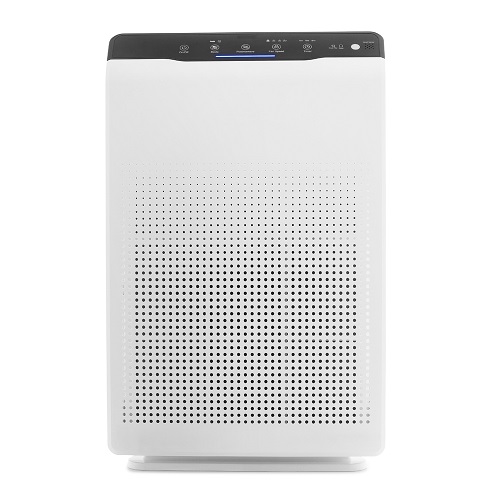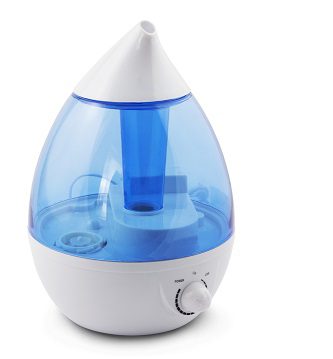The air condition in your locality can affect your lifestyle and health to a great extent. Pollutants in the air can cause allergies, worsen your asthma or lung problems, etc.
The poor air quality in modern urban and suburban areas has become a concern for many people. Improving the air quality inside Euro homes can give many positive results.
If you are looking for an appliance that can improve indoor air quality, confusion between air purifiers and humidifiers is quite common.
These two machines have different purposes, but both can improve the air quality inside your home. So, which one do you need? We are here to guide you! Let’s dig in!
Outline
ToggleUnderstanding an Air Purifier
It is a standalone electronic appliance that collects and cleans harmful particles and allergens from air entering your home. The purifier then releases clean and fresh air indoors.
Types of Air Purifiers
The common types of air purifiers are:
1. HEPA Filter Air Purifier
HEPA (high-efficiency particulate air filter) purifiers are quite common in homes. The filters can easily remove nearly 99.7 % of particles larger than 0.2 microns, keeping your home free of most airborne allergens, dust, dirt, pollen, etc. The dense and mechanically pleated HEPA filter can trap allergens faster and adequately clean the air.
Most HEPA air purifiers have an additional filtration layer to offer better purification.
The best part about such cleaners is that they do not generate ozone or harmful gasses while cleansing continues. But, HEPA air filters cannot remove bacteria and microbes that are in size less than 0.2 microns.
2. Activated Carbon Air Purifiers
The activated carbon purifiers come with a layer of activated carbon that has high porosity and absorbs allergens, dust, smoke, odors, gasses, etc. Most modern carbon air purifiers also have a HEPA filter added to them for better filtration.
3. Ionizer Air Purifiers
Ionizer air purifiers are the newest air purifiers in the market. Such filtering units do not come with filtering layers. Instead, ionizer air purifiers emit negative ions in the air.
The negatively charged ions form bonds with positively charged particles like pollens, dust, etc. The bonded allergens become heavier and fall out of the air, making the air healthier.
Some models even have an electrostatic mechanism that collects the bonded allergens on a teal plate.
The ionizer air purifiers come as large separate units that you must place at multiple locations in your home to get proper air purification.
The best part about ionizer air filters is that they can remove anything except odor. It can even remove bacteria and microbes besides dust and dirt, or pollen. But these machines need regular cleaning and maintenance.
4. Ultraviolet Air Purifiers
Ultraviolet or UV air purifiers use the Ultraviolet Germicidal Irradiation or UVGI technique. These machines force the incoming air through a UV lamp that uses short-wave ultraviolet C light to remove germs, bacteria, pollens, etc.
The best part about this machine is that it can destroy harmful particles by breaking their molecular bond. If you want an air purifier that can kill germs and microbes from the air, it is the best choice.
But, the UV lamps need replacing after one year to ensure the ether machine continues to work.
5. Electronic Air Cleaners
Electronic air cleaners are home appliances that must be attached to the HVAC unit or your home’s furnace. It uses static electricity to clean the incoming air.
The best part about electronic air cleaners is that they can remove 99.8% of allergens. On top of that, one machine is enough for your home as well.
The Electronic air cleaners come with an additional HEPA filter that removes all the particles of size larger than 0.2 microns. The remaining airborne particles are removed by the machine’s positively charged ion and collected on collector cells.
It is a highly effective air cleaner that completely removes odor, smoke, bacteria, dander, microbes, pollens, and almost every airborne allergen.
But, these machines need professional installation. While the collector cells can be cleaned easily, you must clean these cells at least once a month to ensure proper air filtration.
6. Central Air Purifiers
Central air purifiers are also standalone units for the entire home that needs to be connected to your HVAC systems.
These machines are very quiet and can remove 99% of pollen, 94% of microbes, and 98% of dust from the entire home. On top of that, these machines also help to keep the heaters and AC units clean.
But, such models require professional installation and maintenance.
What are Humidifiers?
Humidifiers are specially designed electronic appliances that add moisture to the air to make dry air more comfortable and healthier.
These machines are great for those who can get sick due to dry air, like people suffering from dry skin, asthma, etc. Humidifiers are often used in arid climates where the air contains less moisture.
Types of Humidifiers
The common types of humidifiers are:
1. Ultrasonic Humidifiers
The ultrasonic humidifiers use ultrasonic vibration to create cool or hot mist and add the mist to the incoming air, making the air more comfortable. But, these units are expensive and are not readily available.
2. Impeller Humidifiers
Impeller humidifiers have high-speed rotating discs. These discs create a cool mist that is released into the air inside your home, increasing the humidity.
3. Steam Vaporizers
The steam vaporizer uses electricity to heat water and create vapor. The machine then cools down the mist and releases it into the Air. These are very inexpensive and easily available.
4. Evaporators
Evaporators come with fans and a moistened filter. The high-speed fans create mist from the filter and release it into the air. While evaporators are easy on your pocket, you must install one machine for each room. On top of that, there is no way to adjust the humidity level.
5. Central Humidifiers
Central humidifiers are usually connected to the HVAC unit of your home and are pretty expensive. But, if you are looking for a standalone appliance for your whole indoors, it is the right choice.
The humidifiers come with special filters that continuously release the mist in the air through the duct units. But, these machines need professional installation. On top of that, the filters must also be replaced once in a trimester.
Difference Between Air Purifier Vs Humidifier
The main difference between the air purifiers and the humidifiers is their purpose.
An air purifier removes the allergens like mold, mites, pollens, dust, etc., from the air, giving you cleaner and fresh air. On the contrary, humidifiers artificially add humidity or moisture to the indoor air.
In other words, an air purifier can remove most allergens from the air entering your home. But, it cannot increase the moisture level in the air if the air is dry. On the other hand, a humidifier can only add moisture; it cannot purify the air.
Air purifier Vs Humidifier – Which one Do You Need?
Let’s come to the main question, which one do you need to use? Well, it depends on your situation, the climate where you live, and other factors-
- Poor air quality can worsen your symptoms if you suffer from allergies, COPD, asthma, etc. In this case, an air purifier is the best. The air purifier will remove the allergens from the interior, offering you a clean home with fresh air.
- If you suffer from dry skin disease, eczema, etc., dry air can cause severe problems for your health. In such circumstances, a humidifier can give you some relief as it can improve the air’s humidity level.
- A humidifier is the best choice if you live in a dry climate. People with asthma or breathing problems and are inhabitants of dry climates can also benefit from installing a humidifier. Despite the dry climate, it can also help those who suffer from cold or flu-like symptoms, sinuses, and nosebleeds. If the air is not that polluted, go for a humidifier.
- If you live in an area where air pollution is extremely high, and fog is quite common, go for an air purifier that can remove most of the VOCs from the air, giving you a cleaner atmosphere inside your home.
- If you have a pet inside your home and want to remove the dander faster, an air purifier is the best choice.
- If you live in a humid and hot climate where mold infestation or mites are common, an air purifier must be on your bucket list. It can remove all the airborne particles from the interiors, improving the environment inside the home.
Can I use Both Together?
While humidifiers and air purifiers have different purposes, there is no harm in using these two together. If you live in an area with a dry climate (like scorching and dry summer and cold and dry winter) with high levels of air pollution, using humidifiers and air cleaners can be a boon. The cleaner will remove the allergens and harmful particles.
At the same time, the humidifier will add some moisture to the air, giving you some relief.
If you or your child or family member suffers from asthma or allergies despite living in a dry climate, try using air purifiers and air cleaners to get fresh, pollutant-free air in your home.
Final Words
Air purifiers and humidifiers can be a great addition to your home. While air filters purify the air from pollutants, humidifiers add some moisture if the air is too dry. You need to choose either of them depending on your health condition and the climate you live in.
Whether you install air purifiers, humidifiers, or both, you must ensure the appliances are cleaned and the filters are replaced on time to get the best results.



